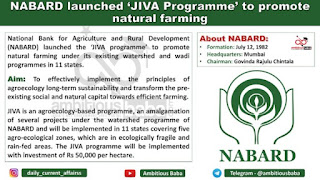Nabard(National Bank for Agriculture and Rural Development) taken initiative to promote Natural Farming under its existing Watershed and wadi projects, and named this project as "NABARD JIVA".
JIVA is a culmination of several projects under the watershed programme...and will be implemented on our existing completed (or near completed) watersheds and wadis in 11 states covering five agroecological zones, which are in ecologically fragile and rain-fed areas," NABARD Chairman G R Chintala said in the virtual launching event.
He said JIVA aims to ensure using the principles of agroecology long-term sustainability and transform the pre-existing social and natural capital, and nudge the farming community towards natural farming as commercial farming cannot work in these regions.
"We will invest Rs 50,000 per hectare under this programme. The JIVA programme will be implemented on a pilot basis in 25 projects across 11 states covering five agroecological zones.
"While the best practices will be implemented on 200 hectares in each project, these 200 hectares will be a learning and proselytising platform to the whole village," he added.
For JIVA, NABARD will collaborate with national and multilateral agencies as this is a knowledge and skill-intensive programme.
NABARD will initially collaborate with the Commonwealth Scientific and Industrial Research Organization (CSIRO), Australia, for simple soil water monitoring technology and ICAR for research support for scientific validation of natural farming practices, Chintala said.
"After the pilot, we intend to scale up the programme to other states across our NRM (natural resource management) projects. Under the JIVA programme, we expect outcomes in resilience to climate change, sustainability and food and nutrition security," he added.
NITI Aayog Vice-Chairman Rajiv Kumar, who was present on the occasion, said climate change is real and it is no longer enough to think about it.
"We need to start acting on it. We need to take measures to put carbon back into the soil. I don't know of any other technology so far that can do it, except for natural farming. "As 86 per cent of our land holdings are held by small and marginal farmers, we need to find a replacement to the biochemical revolution to make our farming nutritional and globally competitive," he added. PTI SM HRS hrs.
 |
 |







